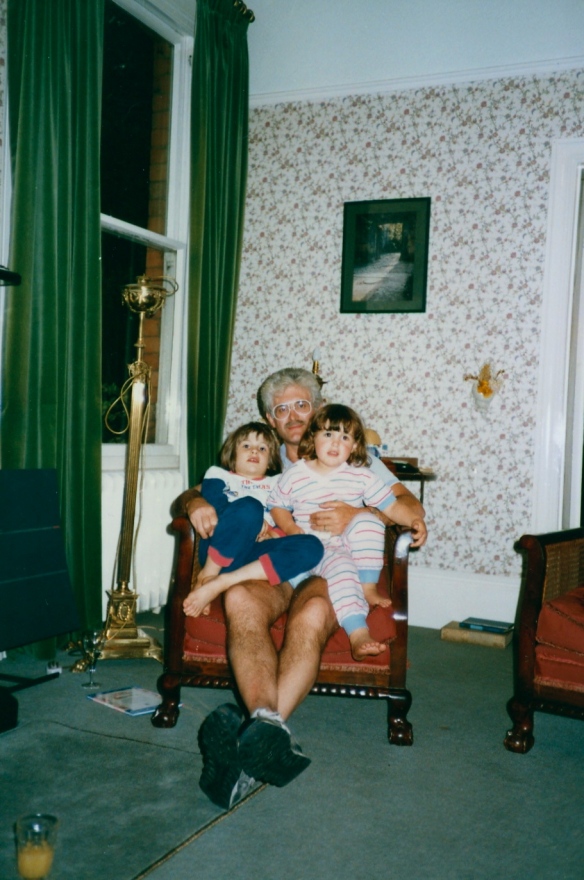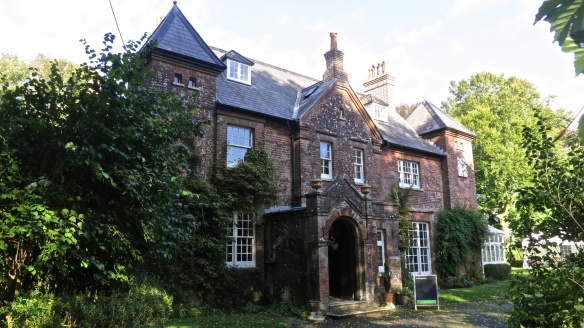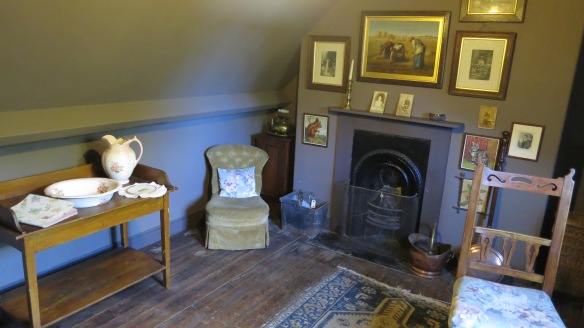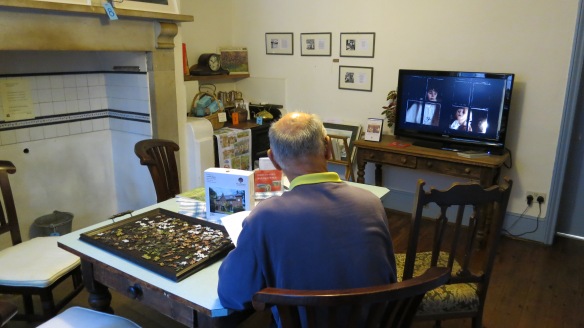Yesterday evening, whilst waiting for Elizabeth before our curry date, Jackie and I had, as usual, a delightful discussion with Danni. We swapped house hunting stories. We also reminisced. It was pleasing to learn that so many of my niece’s childhood memories feature summers in Newark, in particular the fun she and Louisa had over the Chinese restaurant story.
In Eastern Nights I had complimented the very efficient, friendly, and humorous, ‘front of house man’, on possessing just these qualities. I also said he was not intrusive. It must be a fine line between being over-friendly and unobtrusive for restaurateurs to tread. It is probably the experience of the proprietress of what was allegedly Newark’s finest Chinese restaurant that makes me sensitive to this. One evening in the early 1990s, Elizabeth, Rob, Jessica and I visited this establishment for the first time with our children. This woman stood by our round table for virtually the whole meal, saying what a beautiful little girl Louisa was. She just would not go away. All smiles, she decided, the child’s parents must be Jessica and Rob. Elizabeth and I were not exactly chuffed by this, but at least she hadn’t committed the faux pas of James Bird, the young teenager who lived next door when we moved to Lindum House in 1987. He assumed I was my daughter’s grandfather.
For the rest of that 1990s weekend my children called me Uncle Rob, his two called me Dad, and vice versa. I now suspect the two little girls were behind this. We never returned to the restaurant.
Photograph number 95 from the ‘through the ages’ series was taken a little earlier, in 1988, probably by Elizabeth. It gives the flavour of Danni’s memories, and can be dated from the wallpaper, which Michael and James painted over that year. I appear to have been reading a story.
Max Gate is a far cry from the birthplace of the man who designed it. 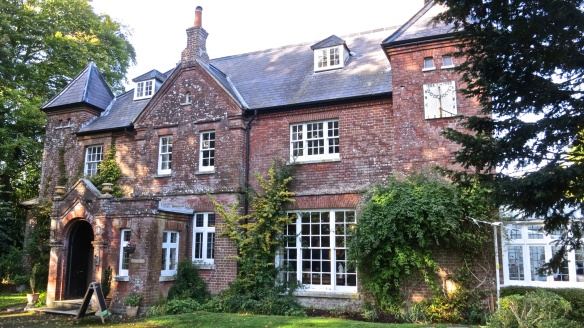 This was Thomas Hardy, famous novelist and poet, trained as an architect. Not at all ostentatious, it is definitely a wealthy middle-class home with a garden to match.
This was Thomas Hardy, famous novelist and poet, trained as an architect. Not at all ostentatious, it is definitely a wealthy middle-class home with a garden to match. 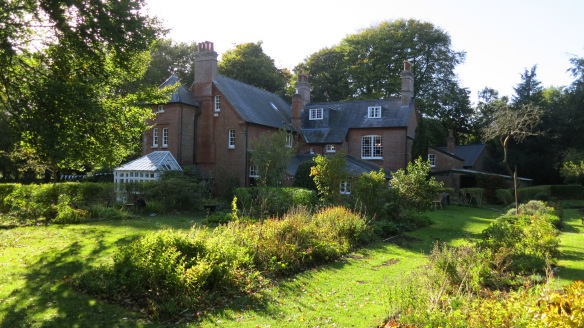 Brian, the National Trust volunteer to whom I am indebted for some of my facts, pointed out that with a house built by his father and brother Henry, both master masons, he had probably been able to improve on normal specifications. I observed to Brian that even the first, most humble, of Hardy’s studies, in which we were standing, was very different from that of his father in the boy Thomas’s childhood home.
Brian, the National Trust volunteer to whom I am indebted for some of my facts, pointed out that with a house built by his father and brother Henry, both master masons, he had probably been able to improve on normal specifications. I observed to Brian that even the first, most humble, of Hardy’s studies, in which we were standing, was very different from that of his father in the boy Thomas’s childhood home.
It was Brian who told me that, following increasing estrangement in the marriage, Hardy’s first wife Emma moved up to the two rooms that she called her boudoir on the second floor.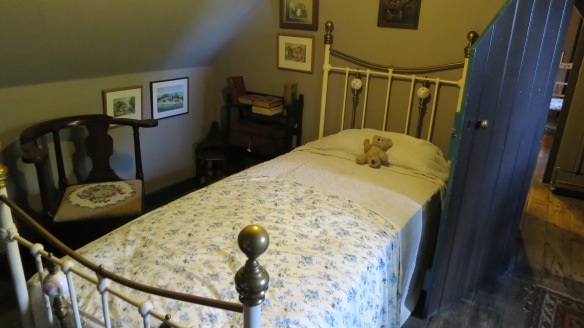 Apparently for the sake of appearances she made what must have been her painful way down a steep set of attic stairs to dine daily with her husband. She was suffering with a failing heart and gallstones that finally killed her. My informant speculated that otherwise she only seldom left her rooms because servants would have attended to her requirements. Despite his apparent neglect Hardy was distraught at her demise and wrote a series of poems based on their early love. He soon married again, his secretary Florence, 39 years his junior, who was equally distressed at his death in 1928.
Apparently for the sake of appearances she made what must have been her painful way down a steep set of attic stairs to dine daily with her husband. She was suffering with a failing heart and gallstones that finally killed her. My informant speculated that otherwise she only seldom left her rooms because servants would have attended to her requirements. Despite his apparent neglect Hardy was distraught at her demise and wrote a series of poems based on their early love. He soon married again, his secretary Florence, 39 years his junior, who was equally distressed at his death in 1928.
Hardy extended a dormer window for his first wife, but this did not prevent me from regarding her rooms as a prison without bars. It seemed to me that she was only marginally better off than Bertha Mason the mad wife of Jane Eyre’s Mr. Rochester, who was kept locked in an attic.
Only comparatively recently opened by the National Trust who previously let the house to a tenant,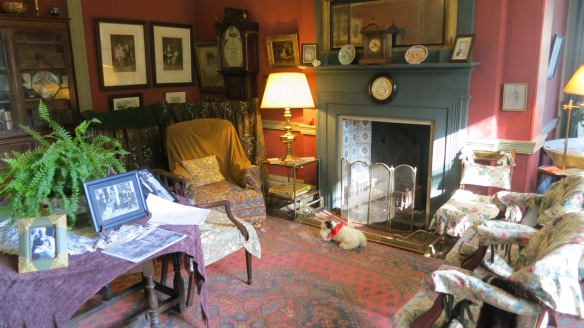 much work has been carried out to stock it with suitable furniture and mementoes;
much work has been carried out to stock it with suitable furniture and mementoes;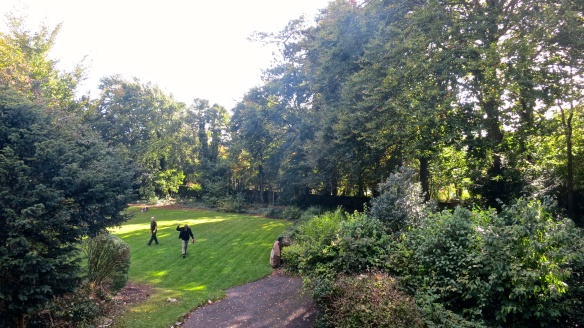 and in caring for the garden, which has the richest compost heaps I have ever seen.
and in caring for the garden, which has the richest compost heaps I have ever seen. 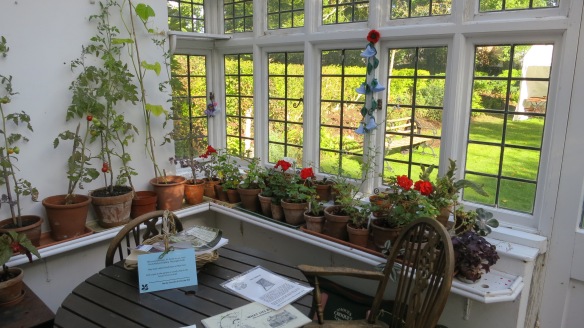 The author’s sister Kate, after her brother’s death, bought the house at auction and eventually bequeathed it to the Trust. Florence, the second wife, had insisted on the contents being sold off separately.
The author’s sister Kate, after her brother’s death, bought the house at auction and eventually bequeathed it to the Trust. Florence, the second wife, had insisted on the contents being sold off separately.
As evidenced by the gentleman reading in the kitchen, we were invited to sit anywhere.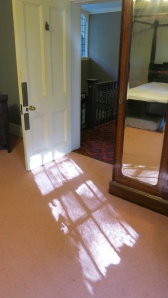 When informed of this I observed, ‘there [was] not a teasel in sight.’ Teasels are discretely placed on National Trust chairs you are not meant to occupy.
When informed of this I observed, ‘there [was] not a teasel in sight.’ Teasels are discretely placed on National Trust chairs you are not meant to occupy.
It was Jackie who observed that the fitted bedroom carpets and telephone points were probably evidence of the tenacy.
Hardy, we are told, had three studies. Not all at the same time. He spent his last twenty-odd years in the third, and most comfortable. 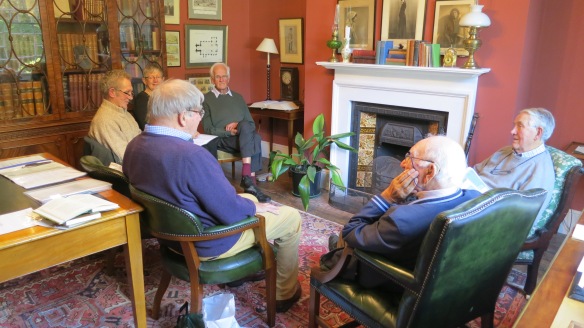 Today, in this room, a poetry group met to read the writer’s poems. We were invited to enter; look around; listen; and, if so inclined, join in.
Today, in this room, a poetry group met to read the writer’s poems. We were invited to enter; look around; listen; and, if so inclined, join in.
Having driven us home, Jackie produced scrumptious pork paprika, green beans, and mushroom rice, followed by apple and blackberry crumble, with which I drank more of the Berberana.
